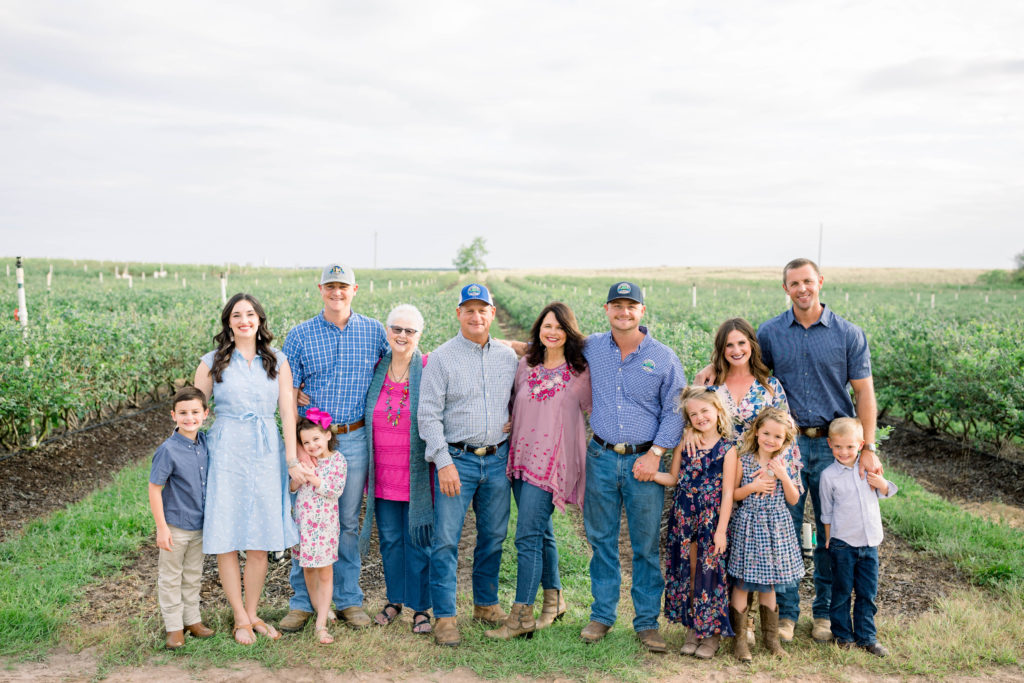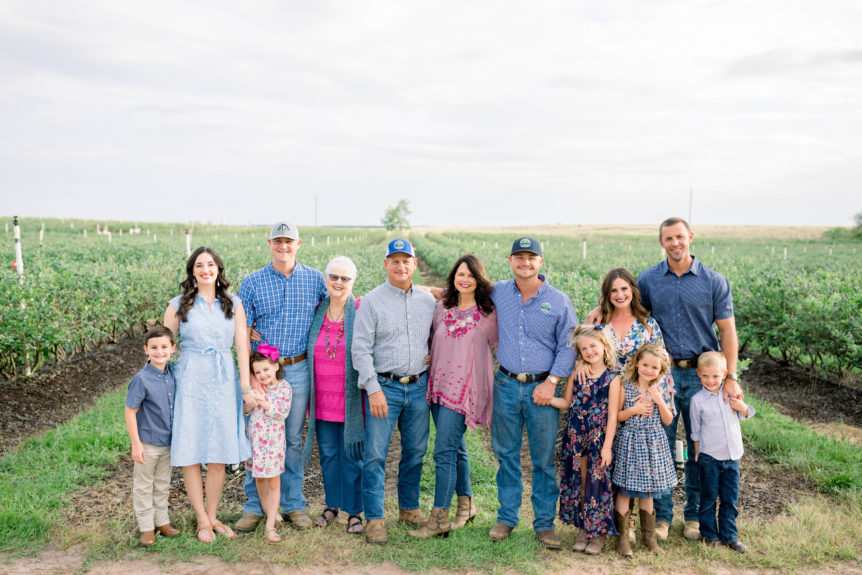
Photo courtesy of Southern Hill Farms
By Frank Giles
Life can come at you fast in farming. Growers in it for the long term learn to adapt with the times and overcome the many challenges that come their way. That is the case with the Hill family, who has been farming in Central Florida for generations.
The family operation has its roots in Lake County. But the business got upended in the 1990s when the state bought out the muck farms on the north side of Lake Apopka. The buyout was part of a larger effort to restore the lake. For David and Lisa Hill, it marked the end of an era but was a period that confirmed their love of farming.
“Lisa’s dad, Billy Long, came to Florida in the early 1950s from Virginia. He rented 20 acres of muck land on Lake Apopka and, over the years, grew that to 1,000 acres of vegetables,” says David. “I was not a farmer before I married into the family. I had other career plans after graduating college. But Billy asked me to come work on the farm … It wasn’t like he had to do a lot of talking me into it.”
Lisa began helping to manage the farm’s books. Meanwhile, their family was growing with three children — Rachael, Michael and Kyle.
“I ended up running the business side of Long Farms, and David ended up running the management side of the farm,” Lisa says. “My brother Bill was our sales manager, and my brother Bo ran our packinghouse. We all had our niches on the farm until the Lake Apopka buyout. That occurred in June 1998. We didn’t want to sell the farm, and we were among the last to sell. It was a dark time for my dad and for David, because they wanted to continue farming.”
New Chapter
After the buyout, the Hills were left at a crossroads. To continue farming meant starting over, and that’s no easy task.
“That chapter closed, and we started a new one. Since this buyout was eminent domain, there were some tax incentives to buy new land,” David says. “We ended up buying this property we are on now, and it became Southern Hill Farms.”
The 120-acre parcel just outside of Orlando was too small for a vegetable farm. The Hills’ first venture on the property was landscape trees which eventually grew to 80 acres of production over about an eight-year period.
“It was OK, but it was not great,” David says. “It was not what I was used to doing, which was growing vegetables. In 2004, we had a lot of hurricane problems, and then when the recession hit in 2008, nobody was buying landscape trees. It was then we decided to get into food crops.”
In 2010, the Hill family began the process of a third adaptation to keep their farming business successful. They began to establish a 40-acre blueberry operation. It took about three years to get the farm up and running between installing irrigation and planting the crop. Their first blueberry harvest was in 2012. Michael had graduated from college and returned home to help with the new venture.
“At the time we got in, prices for blueberries were good,” David says. “We were having someone else pack and market the blueberries. But after the first couple years, we honestly were not too happy with the way the blueberries were being marketed. It was about this time that Michael began suggesting we start a you-pick. I didn’t want to do a you-pick.”
But after a couple of seasons, the family saw the need to diversify because blueberry acreage was on the rise, and prices were coming down. That’s when they put in a small you-pick on the farm. Kyle joined the family business as the you-pick operation was established.
Southern Hill Farms is prime real estate for a you-pick operation with a large population nearby. It is in close proximity to both Orlando and Disney World with good highway access.

Rapid Rise of Agritourism
When the Hills started the you-pick, it would have been hard to imagine what it has grown into today. The first you-pick season was in 2014.
“We built a small barn. Lisa sold blueberry lemonade and muffins out of the back of a vehicle,” David says. “It was a tiny little you-pick, but it felt good and right. I didn’t really expect to feel that way.”
“The next year, the you-pick business tripled, and it tripled again the following season,” David says. “Customers began asking for other things to pick and do. That’s when we began to really see the potential of agritourism as a business.”
In 2016, 5 acres of peaches were planted on the farm to add more options for customers and to extend the you-pick season a little later. The business really began to blossom that same year when the farm hosted its first fall festival, which was held over four weekends in September and October.
Sunflowers Make Splash
As the agritourism business grew, David says his wife and daughter-in-law began suggesting they plant sunflowers on the farm. Again, he resisted.
“What can you do with sunflowers? They were saying it was for the pictures,” he says. “I eventually caved in and planted an experimental 1-acre plot. The women went crazy for them.”
“The first day we opened the sunflower plot, customers were coming up and hugging David and thanking him for planting the flowers,” Lisa says. “That’s when I knew we were golden.”
David adds it was such a popular addition that many people now know Southern Hill Farms more for its sunflowers than its blueberries. The business now has sunflowers available for cutting and photos from September through June.
Adding More Options
While blueberries were the foundation of the you-pick business, strawberries were added to the farm to give customers more options. And just this year, 2 acres of blackberries have been added. Not only are these options popular with customers, but they also widen the window in which the farm can stay open for you-pick business.
“We started with a couple small fields of strawberries in December of 2019,” David says. “It was hugely successful with the customers. It allowed us to open in the wintertime, when it is not as hot, which the customers love. Another benefit is it allows us to hire people for a longer term (8 or 9 months) rather than a short-term window during the season. That’s a big benefit on the employment side of things.”
There are 16 acres of strawberries now planted on the farm, which is too much for you-pick. Like blueberries, the strawberries are also commercially harvested.
“We also added 15 acres of vegetables that are strictly you-pick,” David says. “We grow a whole bunch of different vegetables on plastic. Again, this is another option to widen our you-pick season through the fall, winter and spring. Extending the season is such an important part of making agritourism successful. It gives the customers more options and keeps them happy and coming back.”
Beyond crops, the business has added permanent food trucks, rides, a petting zoo and more entertainment to round out the experience. An events center has just been completed where the family hopes to host things like corporate retreats.
All of these offerings have diversified the farm and allowed it to grow and be successful. It takes a lot of business planning and management, which the family has learned on the go. During peak season, more than 100 employees are required. That’s in addition to H-2A workers who are brought in for commercial berry harvest. On weekends, tens of thousands of people visit the farm.










